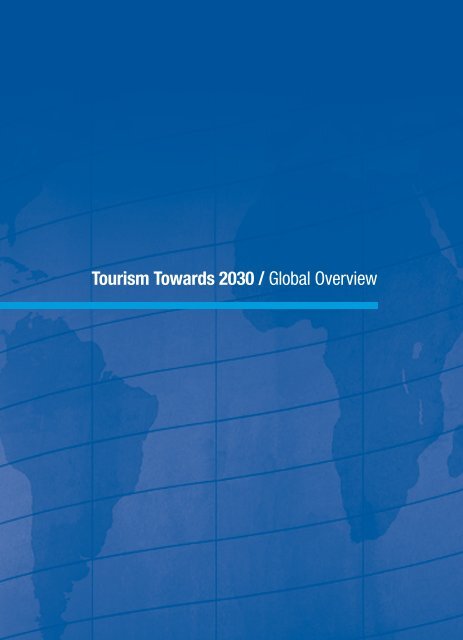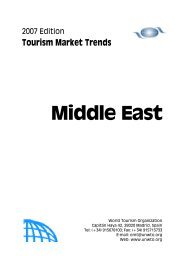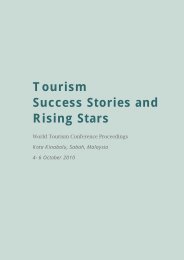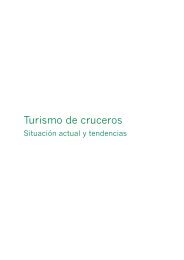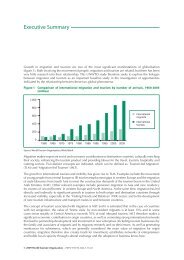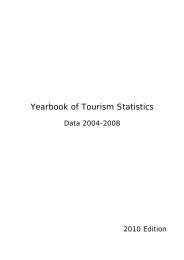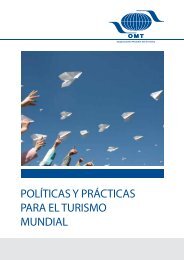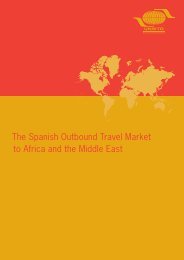Tourism Towards 2030 / Global Overview - World Tourism ...
Tourism Towards 2030 / Global Overview - World Tourism ...
Tourism Towards 2030 / Global Overview - World Tourism ...
Create successful ePaper yourself
Turn your PDF publications into a flip-book with our unique Google optimized e-Paper software.
<strong>Tourism</strong> <strong>Towards</strong> <strong>2030</strong> / <strong>Global</strong> <strong>Overview</strong><strong>Tourism</strong> <strong>Towards</strong> <strong>2030</strong> / <strong>Global</strong> <strong>Overview</strong>1
Index<strong>Tourism</strong> <strong>Towards</strong> <strong>2030</strong> / <strong>Global</strong> <strong>Overview</strong>Acknowledgements04/pageForeword05/pageIntroduction06/pageKey results09/pageWhat if assumptions change?29/pageEpilogue31/pageAnnex: Comprehensive Statistical Tables32/pageCopyright © 2011, <strong>World</strong> <strong>Tourism</strong> Organization(UNWTO) Calle Capitán Haya, 4228020 Madrid, Spain<strong>Tourism</strong> <strong>Towards</strong> <strong>2030</strong> / <strong>Global</strong> <strong>Overview</strong>ISBN-13: 978-92-844-1399-7Design and print / www.detectivegrafico.comPublished by the <strong>World</strong> <strong>Tourism</strong> Organization, Madrid, SpainFirst printing: October 2011 / All rights reservedThe designations employed and the presentation of materialin this publication do not imply the expression of anyopinions whatsoever on the part of the Secretariat of the<strong>World</strong> <strong>Tourism</strong> Organization concerning the legal status ofany country, territory, city or area, or of its authorities orconcerning the delimitation of its frontiers or boundaries.All UNWTO publications are protected by copyright. Thereforeand unless otherwise specified, no part of an UNWTOpublication may be reproduced, stored in a retrieval systemor utilized in any form or by any means, electronic ormechanical, including photocopying, microfilm, scanning,without prior permission in writing. UNWTO encouragesdissemination of its work and is pleased to considerpermissions, licensing, and translation requests related toUNWTO publications.Permission to photocopy UNWTO material in Spain must beobtained through:CEDRO, Centro Español de Derechos ReprográficosCalle Monte Esquinza 14, 28010 Madrid, Spain.Tel.: (+34) 91 308 63 30Fax: (+34) 91 308 63 27Website: www.cedro.orgE-mail: cedro@cedro.orgFor authorization of the reproduction of UNWTO worksoutside of Spain, please contact one of CEDRO’s partnerorganizations, with which bilateral agreements are in place(see: http://www.cedro.org/ingles_funcion_internacional.asp)For all remaining countries as well as for other permissions,requests should be addressed directly to the <strong>World</strong> <strong>Tourism</strong>Organization. For applications see: http://www.unwto.org/pub/rights.htm<strong>World</strong> <strong>Tourism</strong> OrganizationCalle Capitán Haya, 4228020 Madrid, SpainTel.: (+34) 915 678 100Fax: (+34) 915 713 733Website: www.unwto.orgE-mail: omt@unwto.org
Acknowledgements<strong>Tourism</strong> <strong>Towards</strong> <strong>2030</strong> – <strong>Global</strong> <strong>Overview</strong> has been prepared by the UNWTO<strong>Tourism</strong> Trends and Marketing Strategies Programme, on the occasion of the19th Session of the UNWTO General Assembly (Gyeongju, Republic of Korea).The report was carried out under the supervision of Mr. Márcio Favilla Lucca dePaula, UNWTO Executive Director for Competitiveness, External Relations andPartnerships, and Mr. John Kester, Coordinator of the UNWTO <strong>Tourism</strong> Trends andMarketing Strategies Programme.The report was prepared with the collaboration of futures consultancy theTrajectory Parnertship, which set the basis for the econometric model used for theforecasting. UNWTO collaborator Ms. Valeria Croce contributed with text drafting,revision and technical input.The members of the UNWTO <strong>Tourism</strong> Trends and Marketing Strategies team whocontributed at different stages of the report are: Ms. Maria Diana Predosanu,Ms. Sofia Zervou, Ms. Young-Hee KIm, Mr. Fahad Nawaz, Mr. Fernando Alonso,Mr. Michel Julian and Mr. John Kester. We would like to thank Ms. Sandra Carvão,UNWTO Communications Coordinator, who has been involved in the <strong>2030</strong> projectsince its early beginnings.We would like to acknowledge the contribution of all UNWTO Programmes, UNWTOMembers, institutions and experts who provided valuable input for the report.The UNWTO Secretariat wishes to express its gratitude to the Patronato deTurismo de Madrid for its sponsorship in the development phase of the <strong>Tourism</strong><strong>Towards</strong> <strong>2030</strong> project.4<strong>Tourism</strong> <strong>Towards</strong> <strong>2030</strong> / <strong>Global</strong> <strong>Overview</strong> <strong>World</strong> <strong>Tourism</strong> Organization (UNWTO)
ForewordTaleb Rifai / UNWTO Secretary-GeneralFollowing three years of intensive research, we arepleased to present the results of UNWTO’s new longterm forecast for international tourism – <strong>Tourism</strong> <strong>Towards</strong><strong>2030</strong>. We trust that the conclusions of this landmark reportwill assist UNWTO Members and all tourism stakeholdersin understanding changes and trends and formulatingthe appropriate policies and strategies to build a morecompetitive and sustainable tourism sector.The last six decades have seen extraordinary growth fortourism. In spite of the multiple changes and shocks –fromman-made crises, to natural disasters and economic crises,from which the world is still recovering– tourism, althoughvulnerable, has always bounced back, proving its resilienceand capacity to rebound.The next two decades will be of sustained growth forthe tourism sector. International tourist arrivals are set toincrease by an average 43 million a year between 2010and <strong>2030</strong>.At the projected pace of growth, we will surpass the 1 billionmark by 2012, up from 940 million in 2010. By <strong>2030</strong>, thenumber is anticipated to reach 1.8 billion meaning that intwo decades’ time, 5 million people will cross internationalborders for leisure, business or other purposes such asvisiting friends and family every day, besides the four timesas many tourists traveling domestically.There will also be much change beyond the numbers.Future arrivals will be spread more widely across the globe;the share of international tourism to emerging economieswill surpass that to advanced ones, and many of the newarrivals will be to destinations in Asia, Latin America, Centraland Eastern Europe, Africa and the Middle East.The future brings enormous opportunities for tourism totake centre stage in the political and economic agenda,seeking recognition for its contribution to economic growthand development. It also brings added challenges andresponsibilities for our sector to take the lead in mitigatingits potential negative impacts on host communities andthe environment.<strong>Tourism</strong> has evolved into a global phenomenon – one of themost important economic sectors and social activities of ourtime. Today, it contributes directly to 5% of the world’s GDP,one in 12 jobs globally and is a major export sector for manycountries, both in the developing and developed world.The next 20 years will be of continued growth forthe sector. They can also be years of leadership:tourism leading economic growth, social progress andenvironmental sustainability. To make this possiblewe need to make tourism a priority in national policydecisions, foster competitive and responsible businessmodels and practises and increase cooperation betweenthe public and private sectors.Benjamin Franklin said “by failing to prepare, you are preparingto fail”. <strong>Tourism</strong> <strong>Towards</strong> <strong>2030</strong> aims to help prepare us in themost effective way to make the most out of the opportunitiesfor the tourism sector and take a leadership role in the pathtowards fairer, stronger and more sustainable growth.<strong>Tourism</strong> <strong>Towards</strong> <strong>2030</strong> / <strong>Global</strong> <strong>Overview</strong>5
IntroductionBackground and Objectives<strong>Tourism</strong> <strong>Towards</strong> <strong>2030</strong> is a broad research project in continuation of UNWTO’s work in the area of longtermforecasting initiated in the 1990s. It aims at the following objectives:• Assisting UNWTO Members in formulating policies and long-term strategic plans;• Providing a global reference on tourism future development;• Reinforcing UNWTO’s role in agenda setting for tourism-related subjects;• Constituting a reference for UNWTO strategic documents, programme of work and activities.The latest UNWTO project in this area was <strong>Tourism</strong> 2020 Vision, elaborated in the late 1990s andpublished in 2001, with 1995 as base year. This study has since become a worldwide reference interms of international tourism forecast for UNWTO Members (Member States, associate and affiliateMembers), the international tourism community (including local governments, private sector, academia,consultant firms and others), media and the public at large.The aim of <strong>Tourism</strong> <strong>Towards</strong> <strong>2030</strong> is to update projections through <strong>2030</strong>, and to enrich forecasts with anoverview of the social, political, economic, environmental and technological factors, which shaped tourismin the past, and are expected to lead development and growth in the future.What and how do we forecast:modelling tourism demandFor the quantitative forecast, a causal model hasbeen constructed with international tourist arrivals asthe dependent variable and using growth of GrossDomestic Product (GDP), a proxy for traveller affluenceand business travel potential, and cost of transport asindependent variables.International tourist arrivals (international visitors that stayovernight) as reported by destination countries are usedas the key indicator for tourism demand. This is one of thevery few tourism indicators with long, consistent seriesfor all (sub)regions (which is not the case for other seriessuch as domestic arrivals, nights, etc.). This series can bebroken down by trip characteristics such as destination,origin, mode of transport and purpose of visit. Economicdata such as receipts generally cannot be broken down<strong>Tourism</strong> <strong>Towards</strong> <strong>2030</strong> / <strong>Global</strong> <strong>Overview</strong>7


